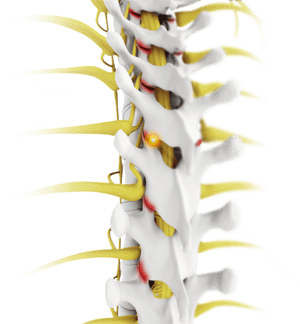
What are Facet Joints?
Facet joints, also called zygapophyseal joints, are synovial joints located at the back of your spine, connecting the vertebrae together. Normally the facet joints are lined by a cartilage and a membrane of synovium. There are two joints between each pair of vertebrae located on either side of the spine. The facet joints provide stability for the spine.
What is Facet Joint Arthritis?
Facet joint arthritis, also known as facet joint syndrome, is a form of arthritis that affects the facet joints of the spine. This condition is related to the aging process.
Loss of cartilage and synovial fluid in these joints causes friction due to contact between the bones. This results in the development of osteophytes or bone spurs in or around the facet joints. Bone spurs are the bony growths formed along the edges of the bones.
Symptoms of Facet Joint Arthritis
The classical symptoms of facet joint arthritis include pain and swelling around the joint. If a cervical joint is affected, the pain is usually felt over the neck, radiating to the shoulder. If the joint is in the back, the pain is felt in the lower back that radiates to the buttocks and upper thigh area.
Diagnosis of Facet Joint Arthritis
A diagnosis of facet joint arthritis is confirmed by injecting a small amount of a combination of X-ray contrast material, local anesthesia and corticosteroid into the joint. Relief from pain after the injection confirms the diagnosis of facet joint arthritis.
Management of Facet Joint Arthritis
In most cases, symptoms can be managed using a conservative line of management such as pain medication, use of braces, exercise and corticosteroid injections. Surgery may be considered in conditions refractory to conservative therapy.



